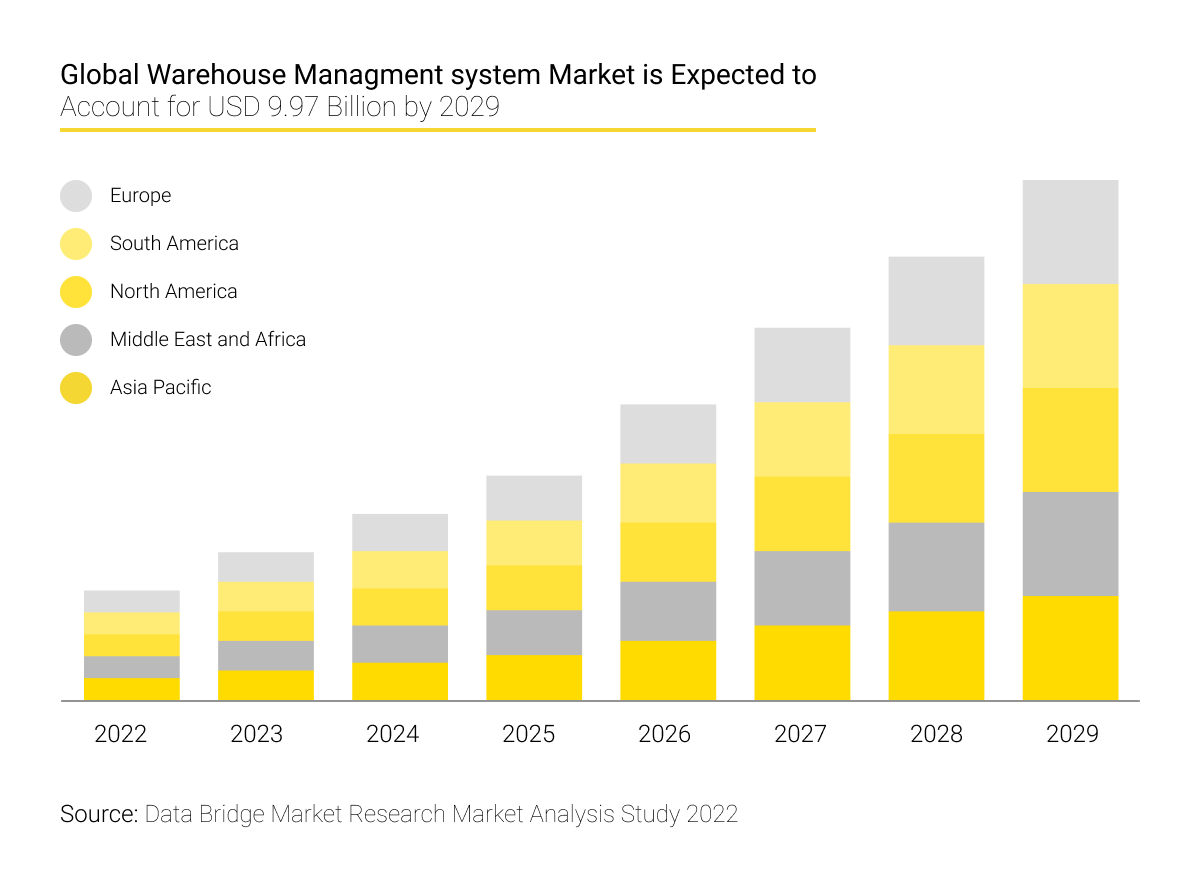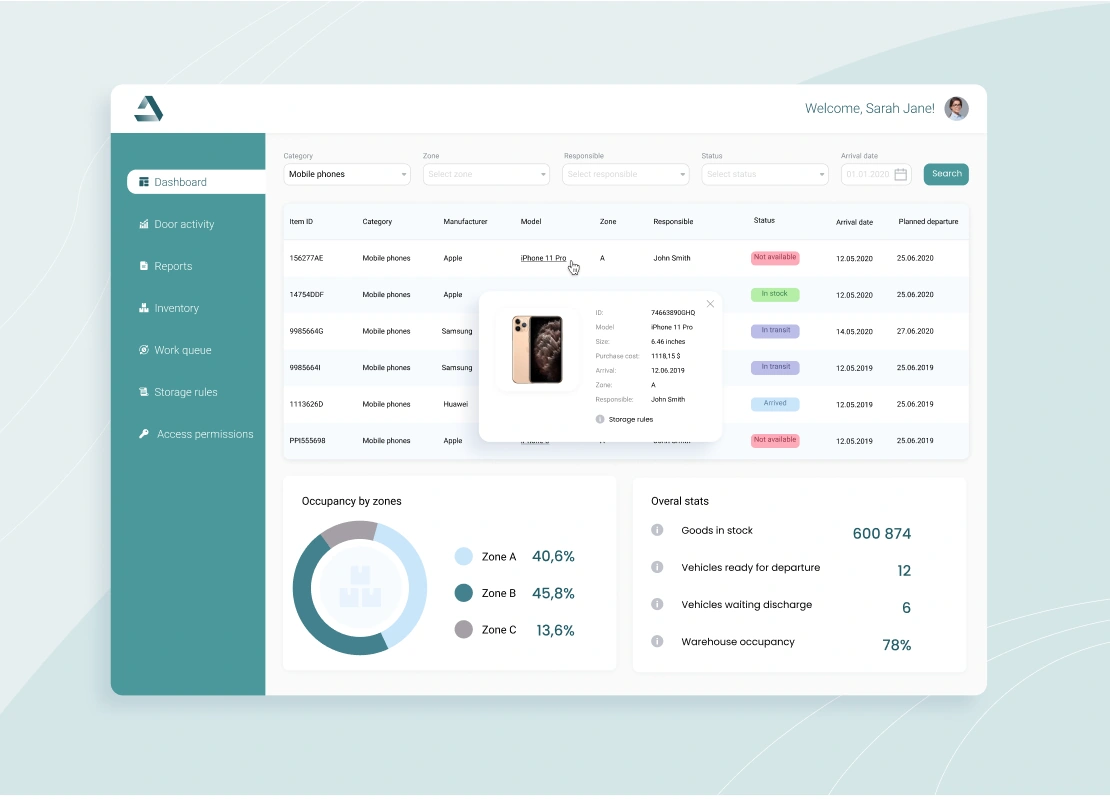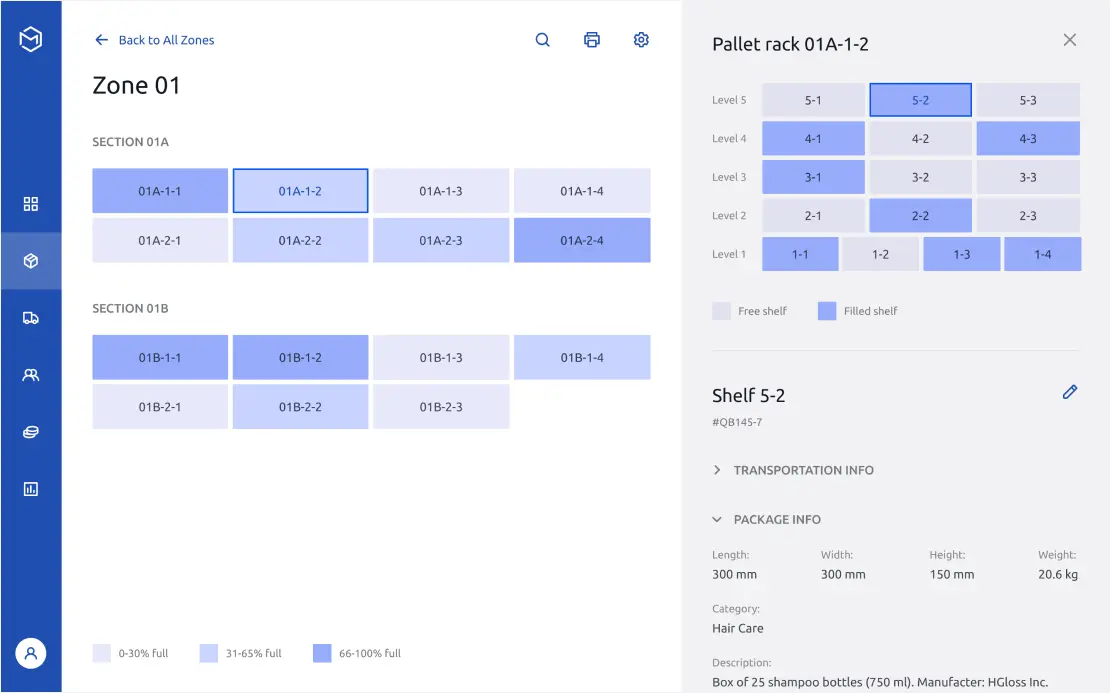- What is a warehouse management system?
- What are the main types of warehouse management systems?
- Best ready-made WMS
- Oracle Warehouse Management
- Dynamics 365 SCM
- Logiwa
- Disadvantages and benefits of a warehouse management system by a custom development company
- An overview of the key warehouse management system features
- How to choose a WMS development vendor?
- To sum up
According to a report by Data Bridge, the worldwide WMS market was worth approximately $2.8 billion in 2021. What’s more, it’s expected to grow at a compound annual growth rate (CAGR) of 17.2% and reach $9.97 billion by 2029. This surge can be attributed to the ongoing global digitization, as well as the significant rise in demand for eCommerce. In this article, we will delve into the critical warehouse management system features and address a pertinent question: which is better for achieving success in the market, custom development or off-the-shelf solutions?

What is a warehouse management system?
To begin with, let’s try to briefly answer this question: ‘What is a warehouse management system?’
A WMS is an app that facilitates the efficient and transparent monitoring and administration of daily operations in a warehouse while keeping costs in check.
Warehouse management system functionality establishes a seamless connection between your warehouse and personnel, ensuring immediate insight into the entire workflow. Its tasks may include:
- Tracking inventory and generating barcodes;
- Monitoring delivery and shipments;
- Picking and packing;
- Slotting;
- Handling returns;
- Auditing;
- Processing data.
Therefore, regardless of the scale of your business, whether it is a small firm or a multinational corporation, you will definitely avail yourself of the benefits of a warehouse management system such as improved operation speed and productivity.
What are the main types of warehouse management systems?
Most specialists agree that there are four types of warehouse management systems.
Simple standalone WMS
These offer limited features and don’t require intricate integrations or complete interconnectedness. Consequently, firms frequently use them for tasks such as inventory tracking and control.
Cloud WMS
This software is delivered in the form of SaaS, granting you prompt and effortless access to a predefined set of features, including analytics and Business Intelligence capabilities.
WMS with ERP
The incorporation of an enterprise resource planning module into your system enhances its capabilities with advanced features, such as managing human resources, client communication, finance operations, marketing and sales, among others.
WMS with supply chain modules
The program integrates such aspects as warehousing, transportation, and distribution with production. It monitors the procurement and replenishment of items, production cycles, partnerships, and more.
Best ready-made WMS
Off-the-shelf software refers to products that have been conceptualized and developed for widespread distribution. This standardized approach is supposed to cater to the requirements of an ‘average’ company. Let’s examine the most prominent representatives of this group. As of now, the estimates published by SelectHub can be viewed as a reliable starting point.
Oracle Warehouse Management
The use of Oracle WMS enables businesses of different scopes to leverage cloud capabilities. Among other benefits, it enables users to plan, organize, and streamline their storage capacities, improve efficiency, and minimize expenses.
Strengths
- Seamless connectivity, automated updates, and reduced errors thanks to the web-based nature of this solution;
- Accuracy ensured by Oracle as a reputable and top-ranked vendor;
- Powerful reporting capabilities.
Drawbacks
- Incompatibility with the Mac OS X operating system;
- Rarely released new versions with in-demand features;
- Convoluted and lengthy integrations with in-house programs.
Dynamics 365 SCM
Dynamics 365 is a WMS with ERP components. Powered by Microsoft Cloud, it provides numerous value-adding features such as immediate informative insights and IoT and AI-based projections.
Strengths
- Impressive cost optimization;
- Elimination of costly downtime for end-users;
- Customizable dashboards for effective processes.
Drawbacks
- This cutting-edge tool is hard to master;
- Some features are exceedingly sophisticated;
- Protracted loading of the information stored.
Logiwa
This web-based tool automates order processing and manages inventory. While primarily targeting SMEs, it can also be employed by larger organizations.
Strengths
- Effortless integrations are among the key advantages of the warehouse management system, allowing firms to swiftly link it with accounting platforms, online marketplaces, and so on;
- Enhanced visibility is ensured thanks to customizable reports that cover shipping and return statuses, stock updates, and more;
- Secure data storage and access.
Drawbacks
- Cumbersome UI/UX;
- Tricky terminology, configurations, and overall logic;
- Potential issues with support services.
Disadvantages and benefits of a warehouse management system by a custom development company
When you opt for warehouse management system development, the results are tailored to your unique requirements. Ordering such a bespoke program has both pluses and minuses.
Cons
- High costs: The more innovative and one-of-a-kind warehouse management system modules you need, the more investments they will necessitate.
- Considerable time to launch: While an off-the-shelf WMS is at your disposal rapidly, creating an elaborated bespoke product is a lengthy process.
- Efforts of your staff: Cooperation of the vendor with your in-house experts at various stages of the project is essential to guarantee that your intentions as a customer have been understood accurately.
Pros
- Fine-tuned solution with impressive ROIs: You will obtain a powerful tool capable of handling your every challenge, efficiently accomplishing daily tasks, and saving you valuable resources in the long run.
- Eliminated security risks: Ready-made programs are, essentially, a black box, with no guarantees as for code quality. When it comes to tailor-made development, you can implement as many safeguards as needed.
- Robust support: You can be sure of high-quality support organized in no time by dedicated managers.
- Compatibility with your tech ecosystem: Companies often employ diverse miscellaneous technologies to manage logistics, staffing, compliance, etc. When you opt for a bespoke program, you can be absolutely sure that it is fully compatible with the rest of your tools.
An overview of the key warehouse management system features
A truly up-to-date WMS includes the following features (the list can be supplemented by additional integrations if the need arises):
- Procurement and purchase order generation: This feature enables users to conveniently look through the data provided by their suppliers and swiftly place orders for the needed items.
- The receiving and putaway capabilities: These allow users to scan purchased goods and place them in the most optimal spots across their storage facilities.
- Storing and stock control: Companies rely on this feature to keep track of their items.
- Sales order generation: Firms can now conveniently manage their sales from any device, availing themselves of automatically generated invoices.
- Picking and packing: Businesses can rapidly search for, select, pack, and ship orders in a cost-effective way.
- Staff administration: WMS covers scheduling, employee reporting, and safety control, allowing firms to assign people, track their efficiency, evaluate performance, build labor cost estimates, and abide by applicable labor regulations.
- Accounting: Finance departments can set customizable metrics, draw up graphs, charts, and projections, generate reports, balance sheets, and more.
How to choose a WMS development vendor?
How can you choose a trusted vendor? Let us exemplify the selection criteria with Andersen:
- What is the overall ranking of the vendor based on their clients’ reviews and assessment by unbiased rating agencies? In our scenario, it is 4.9 on Clutch.
- Does the company employ sufficient staff, and what is their industry experience? In our case, we have 250+ IT experts whose expertise covers supply chains, logistics, and warehouse management.
- Does the company have a portfolio? Andersen’s contains over 150 successfully accomplished software initiatives.
Among other things, this range of success stories includes:
- This WMS with advanced features for a large wholesaler enabled them to seamlessly run their sophisticated supply chain and successfully handle excessive item quantities. The function of the warehouse management system is to automatically update stock availability statuses, assess performance data, generate barcode labels, group orders by different filters, and more.

- This WMS platform for a third-party logistics provider proved to be a game-changer for our customer and substantially enhanced their operations' efficiency. Impressive results were possible thanks to instantly available operational screens, automated collection of statistics, asset tracking in real-time, and other perks.

To sum up
Given the previously mentioned details and referenced facts, it’s safe to assume that a bespoke WMS would be the most advantageous choice for your company if your operations involve intricate procedures. Our team is eager to offer our proficiency in development to build such a solution. Take the first step in launching your IT initiative by reaching out to us today!



